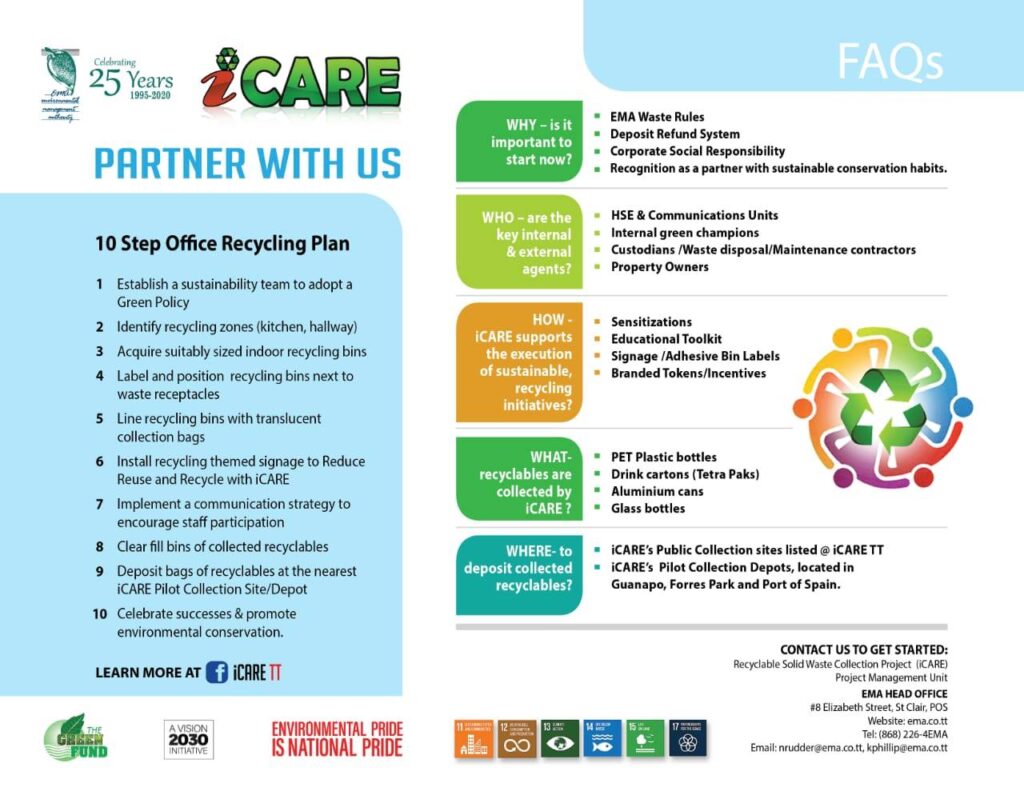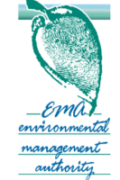iCARE F.A.Q
Yes, click this link to download the ICARE brochure
A Private Public Partnership Agreement was forged between the Tobago House of Assembly (THA), Recycling Waste Logistics Limited and the EMA iCARE project in 2021. iCARE supported the establishment of its fourth Pilot Collection Depot in Shaw Park, Tobago, and the placement of recyclable collection bins in public spaces and schools. Public education and awareness in the sister isle are also being bolstered by iCARE as part of the “Tobago Resource Recycling Initiative” (TRRI). Learn more @TRRIRecyclingCentre
When you recycle with iCARE, you help to preserve the environment by reducing: the human demand for natural resources, the burden on our local landfills and the release of harmful toxins that produce long-term negative health impacts in both humans and animals.
In Trinidad iCARE collects post-consumer beverage containers: plastic (PET/ Type 1) bottles, drink cartons, aluminium cans and glass bottles.
In Tobago a wider range of recyclables are collected: glass bottles, drink cartons, PET/ type 1 plastic bottles, HDPE / type 2 plastic bottles, aluminium cans, tin cans, aerosol cans and cardboard.
iCARE recommends the use of clear bags for recycling; these include yellow, blue, or green coloured bags which are widely available at local supermarkets. Using clear bags helps the haulage contractors to identify contaminated material, as such opaque bags are not preferred
Interested community groups may email the project to request an iCARE bin for a proposed site. Site approval for the placement of an iCARE bin is based on several factors including site suitability, accessibility, proximity to schools and other collection sites, number of beneficiaries, as well as the level of community interest and involvement. Email: kphillip@ema.co.tt
iCARE partners with local businesses to support the adoption of recycling at the workplace and to increase public awareness about the importance of recycling and environmental conservation. Interested businesses can email the project to request information about iCARE’s 10 Step Office Recycling Plan, access recycling signage, bin labels, educational collaterals, and virtual presentations to sensitize staff.

No. With the recent passage of the Waste Management Rules 2021, iCARE encourages businesses to establish their own system to transport stockpiled recyclables from their compound to Pilot Collection Depots, located in Guanapo, Forres Park and Port of Spain. These facilities are managed by SWMCOL, and businesses are advised to contact SWMCOL prior to dropping off their recyclables.
Recyclables collected by iCARE are transported to any of our four pilot collection depots for primary processing. Three Pilot Collection Depots have been established in Trinidad and one in Tobago. In Trinidad, recyclable beverage containers are sorted by type before being transferred to the Beverage Container Recycling Facility (BCRF) in Sealots for secondary processing.
At the BCRF in POS, most of the sorted recyclables are processed into compressed bales or washed and chipped into flakes for export to foreign markets (e.g., Central and South America) where it can be used as inputs to produce new products of value. Glass bottles collected via the iCARE project are processed in Trinidad by Carib Glassworks Limited to create new bottles.
A substantial volume of solid waste generated by humans contains persistent organic pollutants (POPs); these are toxic organic chemical substances which once released into the natural environment can bio-accumulate in the tissue of living organisms, enter our food chain, and produce long-term harmful effects. Recycling helps to minimise the release of POPs into the environment whereas the indiscriminate disposal of solid waste contributes to increased levels of POPs entering our atmosphere, soil, and ground water resources.
The indiscriminate disposal of solid waste in the environment contributes to the release of persistent organic pollutants (POPs) that are toxic to animals. The disposal of solid waste into the environment can contaminate ecosystems which may further result in injury to environmentally sensitive species (ESS) and other life forms higher up the food chain. Studies indicate that as much as 80% of the waste in our oceans comes from land-based sources. Annually, thousands of animals including turtles, birds and other marine creatures become entrapped in our discarded waste or die as a result of ingesting inorganic material mistaken for food.
iCARE championed the first nationwide, pilot curb-side collection of recyclables in 2015. This has since triggered the launch of similar programmes by several Regional Corporations in collaboration with SWMCOL. All recyclables collected via local curbside recycling programmes are processed at Pilot Collection Depots established with the support of the EMA iCARE Project. Contact your Municipal Corporation for further information about pilot curbside recycling in your area.
Incoming correspondence should be addressed to: Recyclable Solid Waste Collection Project (iCARE), Project Management Unit
Environmental Management Authority (E.M.A.)
Head Office
#8 Elizabeth Street, St Clair
Contact: 226-4EMA
Whatsapp: (868) 433-2488
Email: icare@ema.co.tt Facebook: https://www.facebook.com/ICARETTproject/
